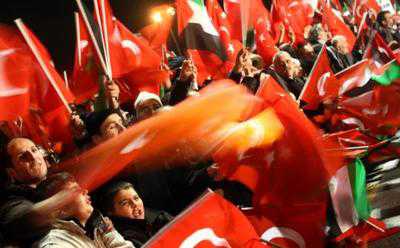By Joshua W. Walker
With the overthrow of Egyptian president Hosni Mubarak on Friday after thirty years in power, it appears increasingly likely that the long-outlawed Muslim Brotherhood will gain political clout in whatever new government emerges in Cairo.

The Brotherhood, suppressed under Mubarak, advocates an “Islamist” agenda, which has alarmed some American analysts worried about the possibility of Egypt turning into a new Iran. But others have argued that the danger posed by the Brotherhood is exaggerated and point to Turkey, where a conservative Muslim party has been in power since 2002, as proof that an Islamic religious movement can coexist with democracy in the Middle East.
Indeed, Turkey has been cited by many as a model for the whole Arab world as it seeks to cope with the demands of greater democratization, economic prosperity, and political representation.
But comparisons to Turkey should be approached with caution. Despite their superficial similarities, the Muslim Brotherhood and Turkey’s Justice and Development Party (AKP) have little in common, Egypt and Turkey represent different political traditions, and the shape of any possible government in Cairo is unlikely to look much like that in Ankara. The Muslim Brotherhood doesn’t look to Turkey for inspiration — and neither should secularists worried about how to contain them.
The first lesson to internalize is that the AKP, despite rhetoric that to some Western ears may sound similar to the Brotherhood’s, is a far cry from more hard-line groups in the region. The Turkish political vocabulary simply does not provide for such concepts as shariato advance an “Islamist” political agenda, as promoted by groups such as the Brotherhood.
Turkey’s geo-political traditions also offer checks on extremism that differ from Egypt’s. As the former imperial head of the Middle East, Turkey inherited a legacy of strong institutions personified by the highly visible role of the military. Turkey is also a member of NATO, and has had a privileged geo-strategic value to the West that provides a moderating influence.
Turkey, unlike Egypt, also has accommodated Islamist groups for decades, which has produced a tradition of Islamic parties playing by the rules that simply does not exist in Egypt. Turkey has experienced four military coups, but since the 1950s has been a multi-party democracy where the military chose to exert its power behind the scenes and allow more conservative Muslim parties to compete as long as civilian politicians abided by the constitutions the military wrote. Attempts to discredit and ban political parties that advocate an explicitly Islamist agenda has kept the AKP committed to Turkey’s secular rules of the political game, and is largely why they have been so successful. The AKP have won every election since its emergence in 2002 as a religious conservative party, whereas the Brotherhood has never played in or by the rules in Egypt — in part because Egyptian authorities moved so aggressively against Islamist parties, leaving them no place in the system.
Because it must compete, the AKP also speaks to Turks across a much wider range of issues. Today the AKP speaks for a large portion of the Turkish voters who want to see changes made in the approach and character of both their Republic and its international relations toward the West and Israel. With a majority of the Turkish parliament and municipal administrations controlled by the AKP since 2002, the very structure of the secular Turkish Republic is beginning to change. Not through a radical revolution, but rather through an incremental and technical process mandated by the Turkish constitution, something the Brotherhood has never been a part of in Egypt. The AKP draws its strength from its pragmatism not its ideology, a lesson that is often overlooked in the contentious debates about Turkey’s “turn to the East.”
With the fastest growing and largest economy in the Middle East, Turkey is uniquely placed to play a decisive role in providing incentives for the newly transformed governments and movements of the region. As a longtime ally of the West and new partner of the Middle East, Turkey has been seeking the role of mediator in every available arena including Egypt, Lebanon, and Tunisia. The AKP has been hosting delegations from Hamas, Hezbollah, and the Muslim Brotherhood since its arrival to power in Ankara and has boasted of itsmoderating effect. This is something Egypt is nowhere close to doing and on which the Muslim Brotherhood has shown little interest given their dogmatic ideological stance.
At the end of the day, the AKP is a uniquely Turkish phenomenon unlikely to be repeated. Turkey did not transform itself from a defeated post-Ottoman state led by Ataturk’s military to a flourishing market-democracy overnight — it has been almost a century in the making. Before pundits turn Turkey into a role model for the post-Mubarak Egypt, we should have a better understanding of the very different contexts in which they have arisen.
Joshua W. Walker is a post-doctoral fellow at the Crown Center at Brandeis University and a research fellow at the Belfer Center at Harvard’s Kennedy School of Government.
, February 13, 2011

Leave a Reply